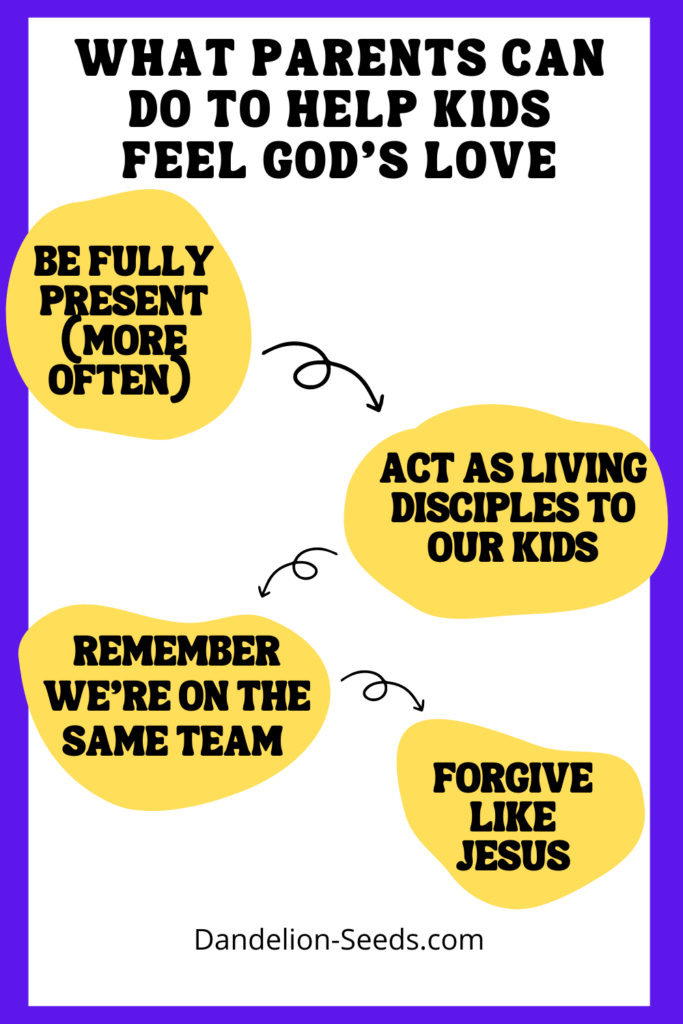
Sign in
Don't have an account with us? Sign up using the form below and get some free bonuses!

How in the world are we humans supposed to love like Jesus? The notion is daunting, especially those of us who are parents. I mean, he's JESUS! Isn't that bar a little high for the rest of us? Parenting is hard sometimes!
To be clear, I am not asking you to BE Jesus (that position is already filled, thank God). Instead, I challenge you to love like Jesus by inviting the Lord into your parenting. With God's help, we can parent without damaging our children -- and bring our kids closer to the Lord in the process.
As Christian parents, one of our priorities is to help our children actively feel Christ's eternal love. We can do that by:
I'll explore each of these below.

Let's be real: being fully present is hard. We live in a highly distractible society filled with an exhaustive list of things to do each day. It's easy to get so immersed in our over-scheduled lives that we lose sight of the importance of being in Christ-like community with one another -- including with our children. I'm certainly not shaming you for this; I'm right there with you.
It's easy to slip into focusing more on the minutia of parenting instead of pondering how we can bring perfect love to our relationship. Wouldn't it be nice if we could just order up some Christ-inspired simplicity from Amazon and call it a day? Curbside delivery for a moment's rest, maybe?
God really does put the onus on us to do the daily work of parenting, and indeed, it is definitely work. Perhaps counterintuitively, part of that work requires that we slow down.
Take time to do "nothing" with your kids every day, even if just for a few minutes. That might look like reading together or snuggling on the couch. It might mean taking those few extra minutes at bedtime to learn about your child's friends or what's stirring in their hearts.
In doing so, we make room for not only the neutral- to positive emotions of running through our busy days, but also for whatever else they feel called to share when we let them be still, physically and emotionally. We must slow down enough to let them feel what they need to process, without their childhood going by in a blur.
(We must do this for ourselves, too, even when it feels like we can't -- God was serious about the importance of the Sabbath).
The point is that we're intentional about slowing down and truly hearing what's behind our kids' words; truly seeing them -- just like Christ does for us. Our kids children feel how God loves them in our quiet moments together.
Example of how to love like Jesus: "Then you will call on me and come and pray to me, and I will listen to you." Jeremiah 29:12. Jesus isn't scrolling his phone while we pray to him. He leans in and listens intently. We can do this, too.
Will our kids feel the presence of the Father in the still and quiet moments of family time, or will they miss God's peace because we're all too busy with all the fun, all the challenges, and all the pitiful pleasures of a life without rest?
Example of how to love like Jesus: "Amidst the busy-ness of the crowds and an urgent pull to be elsewhere, Jesus slowed down and healed the woman who merely reached out and touched his cloak." (Luke 8:43-48) Jesus showed her she mattered by slowing down despite the distractions. We can be less distracted, too.
True presence is different than spending 24x7 together; it's about making sure we don't miss what's going on in our kids' internal world. In doing so, we nurture not only a secure attachment with our children, but we also create neurochemical reactions that reinforce our desire to be together.
Loving presence is a virtuous cycle. God designed it to be so.

When our kids look back someday how we parented them, will they have felt us bringing God's perfect love into our relationships, albeit in our innately flawed version of the heavenly ideal? Or will they have felt something less? Will they remember home as a physically and emotionally safe place for them?
Example of how to love like Jesus: "He is my refuge and my fortress, my God, in whom I trust." (Psalm 91:2) We can make our homes and our family life feel like a true refuge from the world; a safe place where our children learn that Jesus loves them perfectly and unconditionally. They don't have to do anything to "earn" our love.
We can further fortify the walls of our "fortress" by actively praying for our children. Moreover, we can pray with our children; not as an empty habit like feeding the cat or taking out the trash, but by praying when the Spirit moves our hearts. Yes, we can say grace at the dinner table, but it's more than that. Show your kids that God is with us in the big and small things.
Further, talk about faith by reading the Bible together; live faith by going to church; truly living the scripture and loving our neighbors as ourselves (Mark 12:31). That means we model loving all our neighbors -- not just the ones we like, or who voted like we did, or whose skin looks like ours, or whose life choices we support. (And yes, some of this can be really hard.) God isn't picking and choosing who's in the cool crowd. He welcomes everyone who will have him. We don't get to model exclusivity.

If we want to love like Jesus, we need to remember that we're on the same team as our children. When conflict arises, it's not us versus them -- it's us AND them versus the problem we're trying to solve.
God's sincere desire is for families to stay unified for and through him. Because Christ loved us first, we love our children first. That means we wholly love and accept our child "just as they are" before we focus on their behavior -- even knowing they're going to mess up.
To love like Jesus Christ, remember that "Love is patient and kind; love does not envy or boast; it is not arrogant or rude. It does not insist on its own way; it is not irritable or resentful; it does not rejoice at wrongdoing, but rejoices with the truth." 1 Corinthians 13:4–8a (ESV) We're not here to exert power over our children or lead by fear; we're here to guide them peacefully.
Spoiler alert: we as parents mess up, too. Loving each other without resentment or irritability isn't a new commandment. God calls us to be peaceful in every love-based relationship, including those with our kids.
It may actually serve us well to wake each morning affirming, "My child is going to make mistakes today. They don't have the higher level brain functions that allow them to act like an adult yet, much less like Jesus. My child is going to be flawed -- and I'm going to choose to love them anyway. God loved me and invites me to rest in his love without having to work for it. I'm going to do the same for my child."
God's love proactively accepts our flaws; our weaknesses. To be clear, I'm not saying we should expect the worst of our children, nor am I saying all behavior is acceptable. My point is that we focus on the eternal and forgiving nature of God, rather than on his condemnation for our mistakes. We can proactively choose to be peaceful even when it's really darn hard. Peace is always an option in parenting.
If we're struggling to love like Jesus in the ways the Bible asserts, we can focus on self-care, meet with a parenting coach, seek counseling, or find other ways to heal the parent/child dyad. Start with prayer and ask to feel the type of love that Jesus means for you to have with your kids. If requires vulnerability, but God will see us through it.

When we think about how to bless our children with the love of Jesus Christ, we must ask not only who Jesus would love, but also how he would love. Let's explore this.
Sometimes we see our children making choices we believe are wrong. Perhaps its our child's choice of friends; perhaps it's the person they're interested in romantically. Maybe they're acting in a way that would hurt someone else, or not being a good friend to others.
Some parents' response to their children's decisions like these is to withhold love or support from their children until they "shape up." Our feelings of wanting to reject our children's choices make sense, because some of their choices are hard to accept!
At the same time, if we want to love like Jesus, we must remember that Jesus was kind to sinners. He ate with them. He spent time with them; he listened to their stories and loved them before he ultimately died for them. He didn't just give his life for the "small" sins, though, like, "I'll forgive people who get speeding tickets" or "I'll forgive people who occasionally use swear words." Much more than that, Jesus gave his life -- and his full eternal forgiveness -- to the worst of the worst. The Sinners with a capital "S."
Does that mean he accepted all their behaviors and didn't set boundaries with them? Of course not! We know from the Bible that he told them to sin no more. To "turn the other cheek" doesn't mean to turn a blind eye to problems. Our job as parents, however, isn't to send our children into an earthly version of Hell, full of pain and rejection for their transgressions. We can love them and prioritize the relationship in everything we do.
Remember, "Do not be overcome by evil, but overcome evil with good." (Romans 12:21 ESV)
In that Bible story, we all know the son messed up big time. The defining mark of this story, however, isn't the part where the father hands his son the keys to the BMW and says "Sayonara. Get out of here. Don't even think about coming back until you clean up your act." Instead, the focus is on the father's proactive forgiveness of his son -- knowing full well all the mistakes his son was actively making -- and welcoming his son back with joy.
To take this story one step further, when the son did come back, the dad didn't say, "Now, go to your room and stay there until I punish you." This dad, representing the joy of the Lord when sinners turn back to him, danced and shouted happily and threw the kid a party! The point is the reconnection. The healing. The relationship.
There is no feeling of greater love than to be welcomed back with open arms -- and with a feeling of true safety. Jesus loved us this way, and we can love Jesus back by sharing his grace with our children.
Yes, we can have boundaries; and yes, we can uphold family values. When we remember how Jesus loved us first, though, even while we were acting like the prodigal son, we're reminded of his truth, his presence, and his grace. This story is not only a metaphorical story of God's love, but it's also very practical and literal parenting advice.
A common misperception is that, as disciples of Christ, we must punish our children when they transgress. I have yet to find a Bible story where Jesus sought out a sinner so he could punish or shame them. Instead, Jesus demonstrated compassion, even for the worst sinners.
Instead of making them feel worse for what they were doing, he met them with love and gentle, peaceful correction. He saw the struggling person within. His teaching modeled the truth of his peaceful nature. Consequences don't need to be punitive.
Perhaps most importantly, to be God's disciples and model Jesus' teaching, we must live by the Fruit of the Spirit. When we let the Holy Spirit guide our parenting, our children can feel God's grace upon them.
Example of how to love like Jesus: "But the fruit of the Spirit is love, joy, peace, patience, kindness, goodness, faithfulness, gentleness, self-control; against such things there is no law." (Galatians 5:22-23) This Bible verse does NOT go on to say, "...except when your kids are misbehaving, in which case, you should flip out on them and punish them. Go back to 'eye for an eye, baby!'"
Meet evil with kindness; model forgiveness of sins. When we go to God with our sins and sincerely ask for forgiveness, we know we have it. That was the point of Jesus' death on the cross; he died while we were still sinners. We didn't have to do anything to earn it.
We can meet our kids with grace and compassion rather than punishment and wrath.

As John Mark Comer asked in The Ruthless Elimination of Hurry, perhaps we shouldn't ask, "What would Jesus do," but rather, "What would Jesus do if he were me?" When we invite him into our parenting -- the very toughest of the tough moments -- we can feel him calling us to offer grace to our children.
Indeed, love is a practice, and we're all going to struggle not only in our faith, but also in execution of grace-based parenting sometimes. Perfect and faultless love is God's alone. At the same time, when we go the extra mile to intentionally love like Jesus in our parenting, it gives us -- and our children -- practical ways to feel Christ's Word come alive in our homes. May God bless you and your family.
